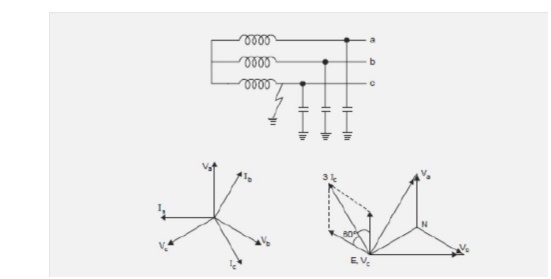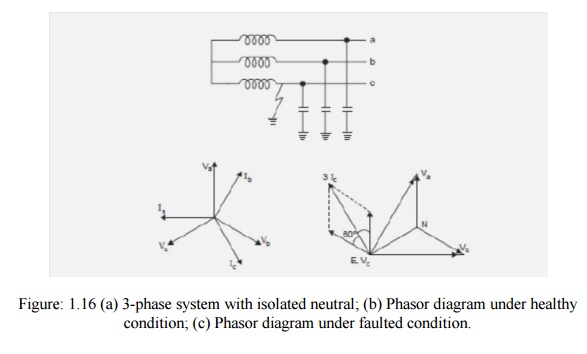Chapter: High Voltage Engineering : Over Voltages in Electrical Power Systems
System Faults and Other Abnormal Conditions

SYSTEM FAULTS AND OTHER ABNORMAL
CONDITIONS
The shunt
capacitances are also shown. Under balanced conditions and complete transposed
transmission lines, the potential of the neutral is near the ground potential
and the currents in various phases through the shunt capacitors are leading
their corresponding voltages by 90┬░. They are displaced from each other by 120┬░
so that the net sum of the three currents is zero (Fig. 1.16 ). Say there is
line-to-ground fault on one of the three phases (say phase ŌĆścŌĆś).The voltage
across the shunt capacitor of that phase reduces to zero whereas those of the
healthy phases become line-to-line voltages and now they are displaced by 60┬░
rather than 120┬░. The net charging current now is three times the phase current
under balanced conditions (Fig.1.16 (c)). These currents flow through the fault
and the windings of the alternator. The magnitude of this current is often
sufficient to sustain an arc and, therefore, we have an arcing ground. This
could be due to a flashover of a support insulator. Here this flashover acts as
a switch. If the arc extinguishes when the current is passing through zero
value, the capacitors in phases a and b are charged to line voltages. The
voltage across the line and the grounded points of the post insulator will be
the super-position of the capacitor voltage and the generator voltage and this
voltage may be good enough to cause flashover which is equivalent to strike in
a circuit breaker. Because of the presence of the inductance of the generator
winding, the capacitances will form an oscillatory circuit and these
oscillations may build up to still higher voltages and the arc may reignite
causing further transient disturbances which may finally lead to complete
rupture of the post insulators.

Related Topics